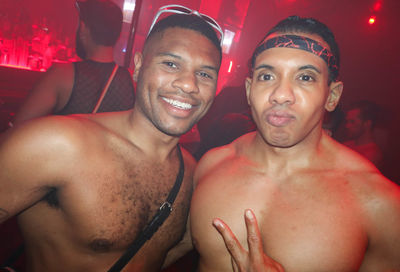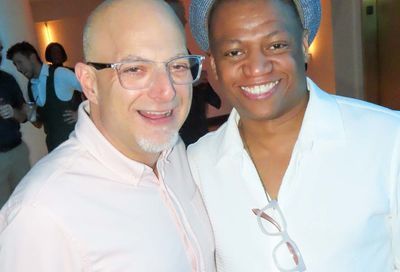Why Iran Matters
Opinion: Town Square
A friend and I were recently shooting the breeze over a pot of coffee when he asked me a question that stopped me in my tracks and put me on the defensive.
”Why are you so upset over Iran executing two boys convicted of rape? Even if they were gay, I wouldn’t waste my time worrying about their deaths or gays in Iran,” said my friend Bob.
Seeing the graphic images on the web of Mahmoud Asgari and Ayaz Marhoni with blindfolds covering their eyes and nooses tightening around their young necks, moments before their gruesome public hangings in Mashad on July 19, stirred my conscience as a gay human rights activist who believes capital punishment should be abolished.
”There’d be something very wrong with me if, after seeing the pictures and learning as much as possible about the case, I didn’t raise my voice objecting to the killings,” I said.
Some of what is known about Asgari and Marhoni, their charges and convictions, and treatment by Iran’s criminal justice system, is subject to much controversy and debate, starting with the matter of the boys’ alleged same-gender sexual preferences.
Adding to the debate are a number of competing agendas: Iranian reformers both in the country and in exile; gay human rights campaigners in Washington who don’t oppose the death penalty but nonetheless tried to use the case to advance their own agenda; and gay bloggers, myself included, demanding that the U.S. State Department publicly denounce the executions as a violation of international human rights treaties driven, in part, by the Iranian government’s homophobia.
Certain facts are not in question. The boys were teenagers when they committed their supposed crimes and at the time of their execution. Iran’s rulers have long attempted to exterminate efforts of Iranian gays to come out and organize — the State Department has noted in an annual human rights report that Iran executed a man convicted of homosexuality and adultery in 1996.
Those are reasons enough for me to be concerned about Iranian gays and the abuses they suffer on a daily basis, and it’s why I’ve organized protests against the Islamist rulers and the silence of the State Department regarding the latest hangings.
But I was not persuading my friend Bob with my argument and facts. He wasn’t about to participate in an upcoming vigil at Harvey Milk Plaza in San Francisco’s Castro district, calling for Iran to halt all executions and for gays to join the movement working towards abolishing capital punishment.
”Just like when I look at photographs of German homosexuals in the Nazi’s concentration camp uniforms, pink triangles and numbers sewn on their shirts, and I can’t help but see myself in their faces, the same thing happens when I see the photos from the public hangings in Iran last month,” I said to Bob. ”Trite as it may be, that cliché of ‘There but for the grace of god, go I,’ resonates with me when thinking about our homosexual brothers and lesbian sisters in that Islamist republic.”
As our coffee talk drew to a close, both of us felt the matters of gays and executions in Iran would quickly fade into the background by the middle of August. Like they say in the journalism trade, the story didn’t have legs. Bob and I said it would be a long time before we spoke of it again.
But the issues flamed anew when reports soon emerged from Iran that two homosexuals, Farid Mostaar and Ahmad Chooka are scheduled for execution on August 27 in Arak. Both men are 27-years-old and were found guilty of kidnapping and raping a 22-year-old man.
Many of us may cringe at the very idea of having to expend gay political capital on behalf of homosexuals, or those with same-sex attractions, who are convicted kidnappers, rapists and murderers facing the death penalty, regardless of whether they are U.S. citizens or live in other countries.
If only all individuals on the world’s death rows were innocent victims worth fighting for to save from execution. However, that is not the reality we face today, making opposition to the death penalty always difficult and sometimes unpopular.
Nevertheless, the gay community’s quest for equality is greatly enhanced when we advocate for a universal halt to capital punishment, if only because such advocacy links us to wider human rights struggles domestically and abroad. It behooves us to work in coalition with groups seeking a full moratorium on the death penalty, generally speaking, and, of course, most particularly when gays and lesbians face the electric chair or the gas chamber or the guillotine or the noose.
Which brings me back to the two homosexuals in Arak, awaiting execution. Even if they are guilty of the serious crimes charged against them, gay political capital must be spent on their behalf, possibly saving them from the gallows and to additionally send a message to the U.S. State Department and world leaders that government-sanctioned executions of homosexuals anywhere in the world, for any reason, will be protested by American gays.
Barring an international effort lobbying Iran’s leaders to grant clemency to Mostaar and Chooka, and the rulers agreeing such outside pressure — very unlikely events, to say the least — two homosexuals will be put to death on August 27.
Even though good friends like Bob are not worried about the fate of these two men or the struggle by pro-reform and pro-democracy Iranian gay activists, who must remain deeply closeted in order to survive, I still believe it’s worth my time discussing our respective stands, just as I feel concerned about our gay brothers and lesbian sisters in other parts of the world.
Any injury to or execution of them is deleterious to me, and the safety of gays everywhere.
Long-time GLBT and AIDS activist Michael Petrelis blogs at www.mpetrelis.blogspot.com.
Support Metro Weekly’s Journalism
These are challenging times for news organizations. And yet it’s crucial we stay active and provide vital resources and information to both our local readers and the world. So won’t you please take a moment and consider supporting Metro Weekly with a membership? For as little as $5 a month, you can help ensure Metro Weekly magazine and MetroWeekly.com remain free, viable resources as we provide the best, most diverse, culturally-resonant LGBTQ coverage in both the D.C. region and around the world. Memberships come with exclusive perks and discounts, your own personal digital delivery of each week’s magazine (and an archive), access to our Member's Lounge when it launches this fall, and exclusive members-only items like Metro Weekly Membership Mugs and Tote Bags! Check out all our membership levels here and please join us today!





















